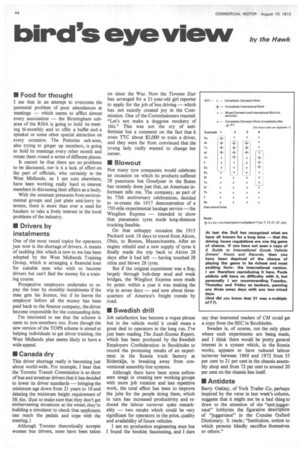• Food for thought
Page 46

If you've noticed an error in this article please click here to report it so we can fix it.
I see that in an attempt to overcome the perennial problem of poor attendances at meetings — which seems to afflict almost every association — the Birmingham subarea of the RHA is going to hold its meeting bi-monthly and to offer a buffet and a speaker or some other special attraction on every occasion. The Potteries sub-area, also trying to ginger up members, is going to hold its meetings every other month and rotate them round a series of different places.
It cannot be that there are no problems to be discussed, nor is it a lack of effort on the part of officials, who certainly in the West Midlands, as I am sure elsewhere, have been working really hard to interest members in discussing their affairs as a body.
With the constant pressures from environmental groups and just plain anti-lorry interests, there is more than ever a need for hauliers to take a lively interest in the local problems of the industry.
• Drivers by instalments
One of the most vexed topics for operators just now is the shortage of drivers. A means of tackling this which is new to me has been adopted by the West Midlands Training Group, which is arranging a financial loan for suitable men who wish to become drivers but can't find the money for a training course.
Prospective employers undertake to repay the loan by monthly instalments if the man gets his licence, but if he leaves the employer before all the money has been paid back to the finance company, the driver become responsible for the outstanding debt.
I'm interested to see that the scheme is open to non-members too. Even though the new version of the TOPS scheme is aimed at helping individuals to get driver training, the West Midlands plan seems likely to have a wide appeal.
• Canada dry
This driver shortage really is becoming just about world-wide. For example, I hear that the Toronto Transit Commission is so short of bus and streetcar drivers that it has decided to lower its driver standards — bringing the minimum age down from 21 years to 18 and deleting the minimum height requirement of 5ft 6in. (Just to make sure that they don't get embarrassing situations at the wheel, they're building a simulator to check that applicants can reach the pedals and cope with the steering.) Although Toronto theoretically accepts women bus drivers, none have been taken on since the War. Now the Toronto Star has arranged for a 21-year-old girl reporter to apply for the job of bus driving — which has not exactly created joy in the Commission. One of the Commissioners reacted: "Let's not make a doggone mockery of this." This was not the cry of antifeminist but a comment on the fact that it costs TTC about $2,000 to train a driver, and they were far from convinced that the young lady really wanted to change her career.
• Blowout
Not many tyre companies would celebrate an occasion on which its products suffered 28 punctures but Goodyear in the States has recently done just that, an American informant tells me. The company, as part of its 75th anniversary celebrations, decided to re-create the 1917 demonstration of a 750-mile experimental haulage service—the Wingfoot Express — intended to show that pneumatic tyres made long-distance trucking feasible.
On that unhappy occasion the 1915 Packard took 18 days to travel from Akron, Ohio, to Boston, Massachusetts. After an engine rebuild and a new supply of tyres it finally made the trip back to Akron 28 days after it had left — having touched 28 cities and blown 28 tyres.
But if the original experiment was a flop, largely through hub-deep mud and weak bridges, the Wingfoot Express soon made its point: within a year it was making the trip in seven days — and now about threequarters of America's freight travels by road.
• Swedish drill
Job satisfaction has become a vogue phrase but in the vehicle world it could mean a great deal to operators in the long run. I've just been reading The Saab-Scania Report, which has been produced by the Swedish Employers Confederation in Stockholm to record the promising results of an experitrent in the Scania truck factory at Sodertiilje, in breaking away from conventional assembly-line systems.
Although there have been some unforeseen snags in creating new working groups with more job rotation and less repetitive work, the total effect has been to improve the jobs for the people doing them, which in turn has increased productivity and reduced the labour turnover quite remarkably — two results which could be very significant for operators in the price, quality and availability of future vehicles.
I am no production engineering man but I found the booklet fascinating, and I dare say that interested readers of CM could get a copy from the SEC in Stockholm.
Sweden is, of course, not the only place where such experiments are being made, and I think there would be pretty general interest in a system which, in the Scania works, appears to have reduced labour turnover between 1969 and 1972 from 55 per cent to 21 per cent in the chassis assembly shop and from 72 per cent to around 20 per cent on the chassis line itself.
• Antidote
Barry Oakley, of York Trailer Co, perhaps inspired by the verse in last week's column, suggests that it might not be a bad thing to draw to the attention of the "anti-juggernaut" lobbyists the figurative description of "juggernaut" in the Concise Oxford Dictionary. It reads; "Institution, notion to which persons blindly sacrifice themselves or others."




























































































